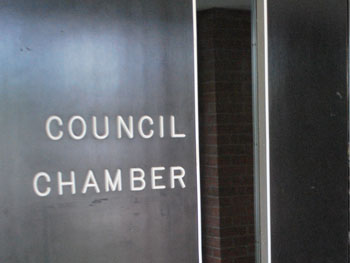June 17, 2013 Ann Arbor Council: Final
The council’s June 17, 2013 meeting could include final action on two ordinance revisions. One local law relates to the regulation of digital signs and billboards. The other law regulates the time of day when fireworks are allowed to be set off. While the fireworks regulation is probably seen as somewhat uncontroversial, the council might be inclined to postpone the final vote on digital signs and billboards – as it has done previously.
In addition to possible final votes on those two ordinance changes, several items related to the 15th District Court appear on the council’s agenda. The court handles all civil claims up to $25,000, including small claims, landlord-tenant disputes, land contract disputes, and civil infractions, as well as preliminary exams for felony cases. Salaries for judges are reimbursed by the state, but the court is funded by the city through its regular budgeting process, with other costs borne by the city or by grants.
The council will be asked to approve an adjustment to the city’s current fiscal year’s budget (FY 2013) to bring it in line with actual expenditures. The general fund total budget adjustment is to increase it by $567,000. And of that, a significant part is attributable to the 15th District Court – including $112,000 in salary increases based on an interest in retaining employees, $203,000 due to a “catch up” payment to the law firm that provides indigent representation, and a back-bill for security from Washtenaw County for two fiscal years for $110,000.
Also on the council’s agenda is the authorization of a contract revision for the current year with the law firm that provides indigent representation. The “catch up” payment stems from the firm’s practice of delaying billing until a defendant’s legal costs are thought to be complete – instead of billing along the way. Because that approach doesn’t give a clear picture of the actual current cost of indigent representation, a new contract with the firm for next year (FY 2014) will be based on a flat fee. That $240,000 annual flat-fee contract is with Nassif and Reiser, P.L.L.C. (f/k/a Funkhouser and Nassif, P.L.L.C.), d/b/a Model Cities Legal Services (“MCLS”). Nader Nassif is a board member of the Ann Arbor Downtown Development Authority.
The council will also be asked to approve a $160,000 contract with the Washtenaw County sheriff’s office for weapons screening at the Justice Center, the building next to city hall that houses the 15th District Court. The estimated annual cost is based on $25.25 per hour per court security officer.
On the consent agenda – a group of items that are considered routine and voted on as a group – are two other items related to the 15th District Court. One is approval of $30,000 for a Sobriety Court grant program contract with the Washtenaw Community Health Organization (WCHO) to provide mental health treatment to 15th District Court defendants. The second is approval of $65,000 for a Sobriety Court grant program contract with the nonprofit Dawn Farm to provide in-patient and out-patient drug abuse counseling to 15th District Court defendants.
The Dawn Farm item includes a provision that could cause it to be pulled out of the consent agenda for separate consideration. That possibly controversial provision is a waiver of the city’s living wage ordinance for Dawn Farm to provide its counseling services. According to the staff memo accompanying the resolution, Dawn Farm employs 70 people, including 15 employees who are paid less than $12.52 per hour with health care coverage, and 18 people who are compensated at rates less than $13.96 per hour without health care coverage. Those are the rates specified in the city’s living wage ordinance. Last fall the council engaged in a vigorous discussion of a living wage ordinance waiver for Community Action Network (CAN), which ultimately resulted in the granting of a waiver at the council’s Nov. 8, 2012 meeting.
Other agenda highlights include revisions to contracts for six unions in the police department, which include a 2% wage increase starting July 1, 2013 and another 1% starting Jan. 1, 2014.
At the June 17 meeting, the council may also vote to adopt revisions to its own internal rules. Among other changes, the revised rules would reduce speaking times for the public from three to two minutes per turn.
Some other agenda items relate to site plans and brownfield plans.
Details of the meeting agenda are available on the city’s Legistar system. Readers can also follow the live meeting proceedings on Channel 16, streamed online by Community Television Network.
The Chronicle will be filing live updates from city council chambers during the meeting, published in this article “below the fold.” The meeting is scheduled to start at 7 p.m. [Full Story]




